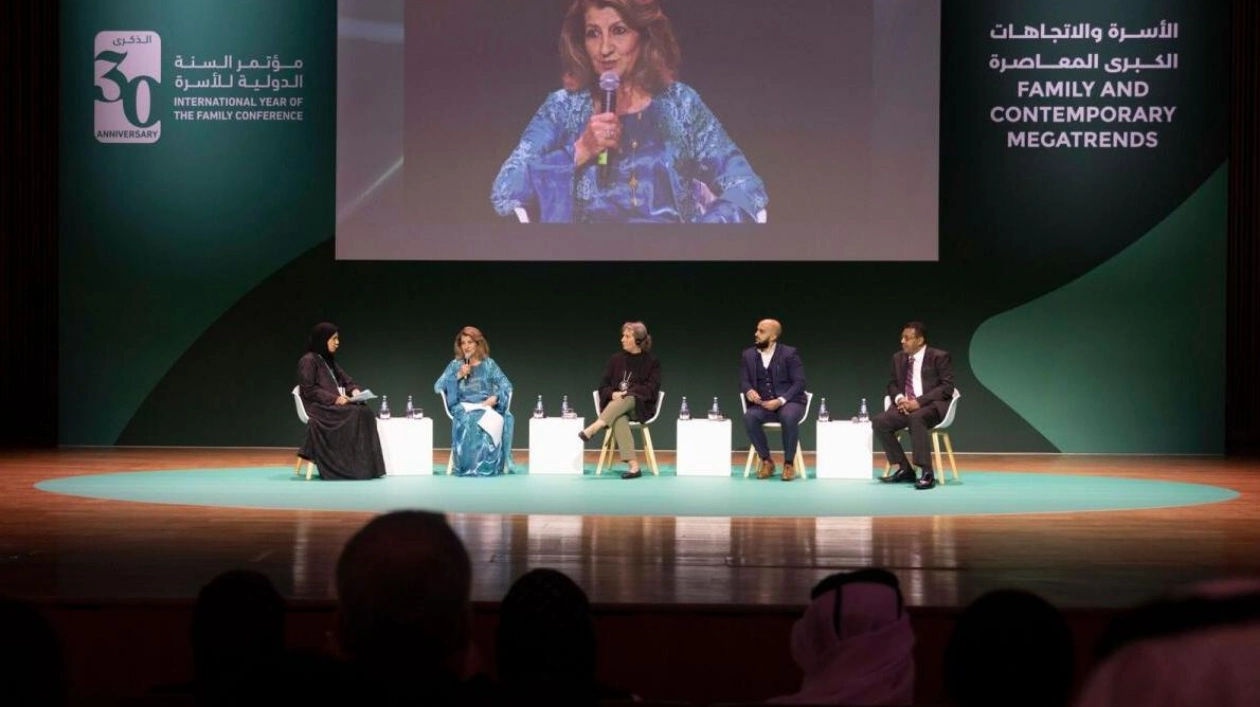Shanaz Ibrahim Ahmed, the First Lady of Iraq; Maya Morsi, Minister of Social Solidarity in Egypt; Dr. Amthal Hadi Hayef Al Huwailah, Minister of Social Affairs and Family and Childhood Affairs in Kuwait; Dr. Hector Hajjar, Minister of Social Affairs in the Republic of Lebanon; along with other international ministers and dignitaries, attended the conference.
Policies aimed at protecting families in conflict-affected countries, the global impact of population decline, and the balance between work and family life were central themes at the 30th anniversary of the International Year of the Family Conference on Family and Contemporary Megatrends. Organized by Qatar Foundation’s Doha International Family Institute (DIFI) in collaboration with the Ministry of Social Development and Family, the Ministry of Foreign Affairs, and the United Nations Department of Economic and Social Affairs (UNDESA), the event brought together over 2,000 experts and policymakers from around the world to delve into key trends affecting families and policies that reinforce the family’s crucial role in society.
The conference was graced by prominent figures from across the Arab world, including Shanaz Ibrahim Ahmed, the First Lady of Iraq; Maya Morsi, Minister of Social Solidarity in Egypt; Dr. Amthal Hadi Hayef Al Huwailah, Minister of Social Affairs and Family and Childhood Affairs in Kuwait; Dr. Hector Hajjar, Minister of Social Affairs in the Republic of Lebanon; and other international ministers and dignitaries.
Sheikha Moza bint Nasser, Chairperson of Qatar Foundation, opened the conference by stating: “The issues facing families are similar across societies but vary in nature from one country to another. Families in the global North and South share common concerns, notably the adverse effects of technology and preserving mother tongues and cultural identities in an increasingly globalized world.”
According to groundbreaking research reports by Duke University and DIFI, 84% of parents in the region are worried about the impact of screen time on family relationships, while 67% are concerned about the potential loss of traditional values in the digital age.
The United Nations General Assembly established the International Year of the Family in 1994, highlighting the family’s vital role in society and the need for protection and support. Held every decade, the conference plays a crucial role in shaping policies and programs that empower families.
Deputy Secretary-General of the United Nations and Chair of the United Nations Sustainable Development Group, Amina J. Mohammed, emphasized the importance of global action to safeguard families, stating: “The burden often falls on women and children—from Gaza to Sudan, Sudan to Ukraine, Ukraine to Myanmar, and many other places. It is our duty in this forum to ensure that family policies include everyone and leave no one behind.”
Over two days, participants explored four major global megatrends—technological change, demographic change, migration and urbanization, and climate change—and their impact on families in Qatar, the region, and worldwide.
In a discussion on ‘Work-Family Reimagined,’ Dr. Maimoonah Khalil Al Khalil, Secretary-General of the Family Affairs Council in Saudi Arabia, addressed the challenges faced by working families: “Research indicates that long working hours for both parents affect fertility, marriage age, and divorce rates. Initiatives must be introduced to ensure women are active in the workforce while also fulfilling their parenting roles effectively.”
In the session ‘Shattered Lives: The Impact of War and Conflict,’ Palestinian researcher and academic Dr. Nour Naim, Executive Director of AI Minds Academy, discussed the targeted destruction of the middle class and education in Gaza. “The strength of the Gazan community lies in its strong family ties. Families are living together, supporting each other as one. These values are the bedrock of society in Gaza. Unlike in typical war scenarios, there is a robust civil society with youth volunteers supporting poor families and providing nursing care.”
The panel ‘Saving the Earth, Securing the Family’ examined the impact of climate change on families, focusing on climate-induced migration, food security, water scarcity, and eco-anxiety. Her Excellency Mahinur Özdemir Göktaş, Minister of Family and Social Services in Türkiye, emphasized: “Collective responsibility is key. Global government institutions need qualified personnel and financial support. Cooperation between countries is essential to exchange experiences and implement effective, sustainable policies to address climate change challenges.”
Dr. Mohammed Behnassi, Senior Environmental Expert at the Economic, Social and Environmental Council in Rabat, Morocco, highlighted three interconnected climate change phenomena affecting families: “First, climate-induced displacement; second, food insecurity exacerbated by climate change; and third, war insecurity. These challenges are driving climate migration, which is intensified by water stress, flooding, desertification, and deforestation.”
The conference concluded with the ‘Doha Call to Action,’ a series of recommendations stressing the importance of family-oriented policies and empowering families to contribute to development. These recommendations will now be discussed with governments and policymakers.
Source link: https://www.khaleejtimes.com






